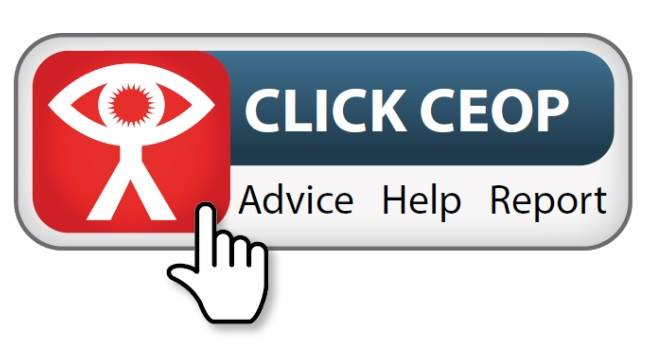Online Safety
Internet Safety information for parents.
The Click CEOP button (pictured above) is an asset of the National Crime Agency’s CEOP Command. The CEOP Command works to protect children from the harm of sexual abuse and exploitation both online and offline.
The button has been developed to offer children, young people, parents/carers and professionals working with these groups with a simple and convenient mechanism for gaining access to trusted online safety advice, help and support. It also provides access to an online mechanism for reporting known or suspected child sexual exploitation or child sexual abuse directly to CEOP. This is offered as a convenient and potentially less intimidating method of reporting these sensitive types of crime, alternative to face-to-face and telephone reporting to local police forces.
Clicking on the CEOP Image above will take you to the CEOP Website.
The CEOP Safety Centre
The Click CEOP button provides a gateway to the CEOP Safety Centre, an area of the CEOP website offering:
- advice on a range of online safety issues, such as hacking and cyberbullying;
- signposting to NCA-CEOP partners offering help and support on issues outside of CEOP’s remit, such as ChildLine and BeatBullying;
- reporting of suspected or known child sex offender activity directly to CEOP for investigation.
Reporting to CEOP
- CEOP operates a 24/7 service for the receipt of reports.
- Reports can be made to CEOP by a young person or on their behalf by a parent/carer or professional working with these groups.
- Children under 11 years of age are encouraged to tell an adult that they trust about what has happened and to ask for their help in reporting this either to CEOP or local police.
All reports to CEOP are treated as reports of crime and as such anonymous reports cannot be accepted.
Here are some other links that you may find useful to articles to help you understand how to make computing safe for you and your family:
Gaming - what parents and carers need to know.
Sharing pictures of your child on-line.
Keeping your under 5s safe online
Live streaming - responding to the risks.
The following links highlight a range of resources which will cover a variety of online safety issues. Most resources are appropriate to be used within PSHE curriculum. Please ensure you are happy that any materials suggested by www.kelsi.org are appropriate for the age of your child. Some material is designed to be used preventatively, so will not be suitable for use directly with children if they have experienced harm online.
Cyberbullying
- Childnet:
- It's only a game (KS2)
- TES
- Combating Cyberbullying Pictures (KS2/3)
- BBC:
Social Networking, Privacy and Self-Esteem
- Netsafe: Keeping accounts safe (KS2/3)
- Azoomee (App - KS2)
- BBC
- Protect thy privacy settings (KS2)
- Dixi (KS2)
- Children’s Commissioner, TES and Schillings: Young people's’ rights on social media packs (KS2/3/4):
Online Child Sexual Exploitation and Abuse
- Think U Know (EYFS/KS1/KS2)
- Azoomee (App - KS2)
- BBC:
- CBBC Caught in the web - Webcam Risks (KS2/3)
- CBBC Caught in the Web: Making Friends Online - The Risks (KS2/3)
"Sexting"
- Think U Know (EYFS/KS1/KS2)
- Azoomee (App-KS2)
- BBC:
Sex and Relationships Education
- Barnardos Real Love Rocks(KS2/3)
Gaming and Films
- Think U Know - Play Like Share (KS2)
- LGfL Who Can Play? Media Violence in Computer Games (KS2)
- BBC:
Mobile Phone Safety
- Childnet and PSA: Being smart with your smartphone (KS2)
Radicalisation and Extremism
- Educate Against Hate (KS2/3/4) - DfE website that includes curriculum content as well as training resources for professionals and leaders/managers
- Childnet: Trust me Resources (KS2/3)
'Fake News', Reliability and Critical Thinking
- Newswise (KS2) - New
Fact Checking Tips and Websites
Examples of "Fake" news or content websites
Cybercrime
- Get Safe Online (KS2/3/4)
Piracy, Viruses, Plagiarism and Copyright
- Industry Trust and Into Film: Meet the Malwares (KS2/3)
- Cracking ideas - Teaching resources from the Intellectual Property office (KS1/2/3/4)
- Azoomee (App - KS2)
- Get Safe Online (KS2/3/4)
- Password Tips from Cyber Aware
- Copyrights and schools
- BBC:
- Dealing with unwanted emails (KS2)
- Beware what you download (KS2)
Resources for Learners with Special Educational Needs and Disabilities (SEND)
- Childnet:
- Think U Know
- East Midlands E-Safety project
- NetSmartz
- Cybersmart-Access
- Better Internet for Kids Gallery: Resources for children with EAL
- NSPCC Keeping children safe -
- Mencap - Internet Safety
- Anti-bullying Alliance
- National Autistic Society (NAS)
- Kidscape - Anti-bullying
- BBC:
Search Engines
No search engine is ever completely safe; appropriate supervision, pre-checks and risk assessments should always be carried out by staff prior to use in the classroom.
If settings use search engine sites such as Google or Bing with learners then they must ensure safe search filtering tools are applied. Settings must be aware that this only reduces (not removes) the possibility of accessing inappropriate content either accidentally or otherwise due to the use of https. Settings must ensure that necessary processes are in place to respond to any filtering breaches. This would include policies and procedures for reporting unsuitable content (for learners and staff), appropriate supervision and pre-checking of search terms, as well as education regarding safe searching and online reliability prior to use.
The following search engines are not endorsed or promoted, education setting leaders and parents should make decisions based on a risk assessment approach and explore the benefits and as well as the risks of allowing and not allowing access.
- BBC Safe search - (only searches BBC content)
- DK Find Out! - Searches Dorling Kindersley content
- Swiggle (SWGfL)
- Primary School ICT - video, picture and website search engine
- NEN image gallery - for images to use in the classroom
- Pics4Learning - for images to use in the classroom





